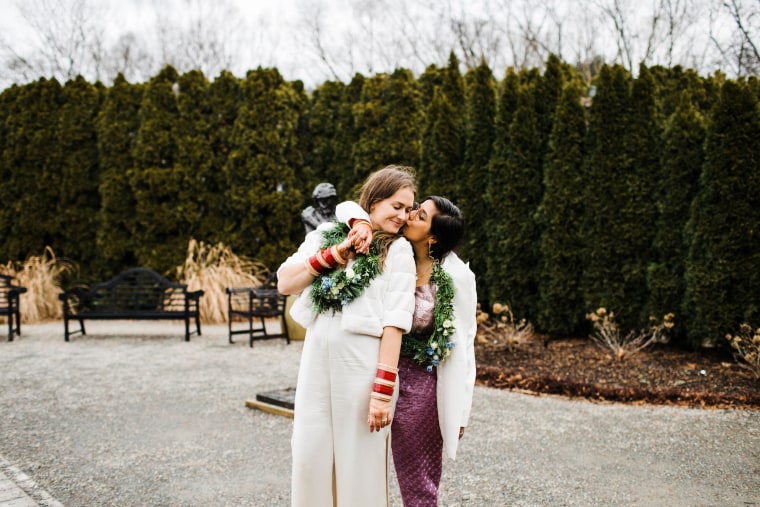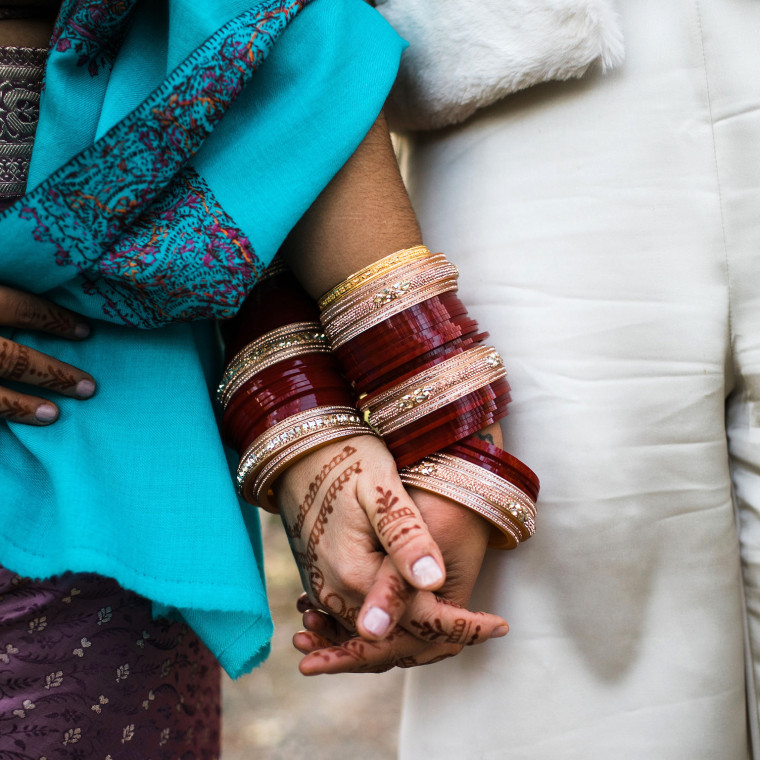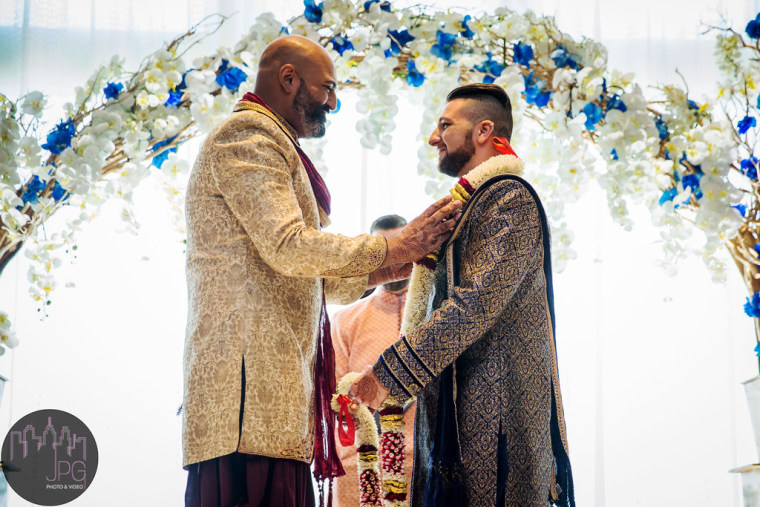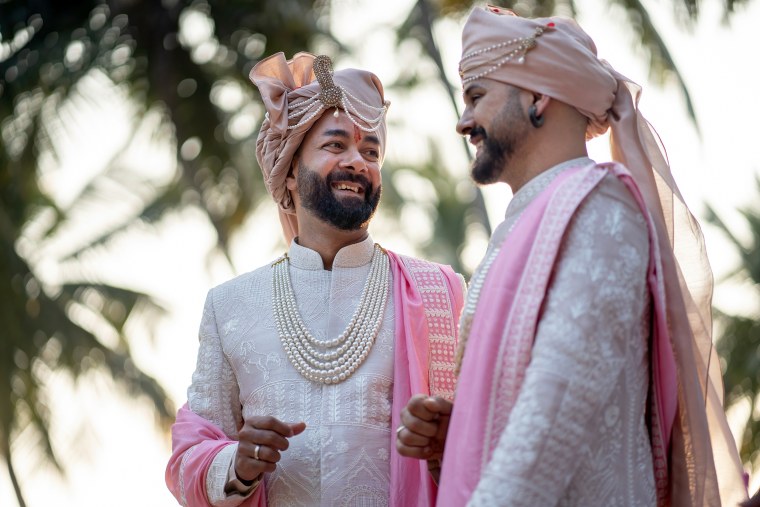Shortly after last month's debut of the Netflix docu-series "The Big Day," which follows several Indian couples as they plan their extravagant weddings, Sunil Ayyagari began getting messages from family members.
"My cousins were like, 'Have you seen the gay wedding episode?'" said Ayyagari, a marketing executive based in New Jersey. Their curiosity was understandable, as Ayyagari married his husband, Stephen Shinsky, in May 2019 in a ceremony that highlighted Indian traditions.
"The Big Day" showcases six weddings that represent the highest end of India's $50 billion wedding industry. One of the show's most memorable couples was former cruise ship captain Tyrone Braganza, who is from the Southern Indian city of Goa, and the German-born celebrity makeup artist Daniel Bauer. Viewers watch as Braganza and Bauer work to create wedding ceremonies that both acknowledge their relationship and honor the traditions of Braganza's Goan Catholic family, Bauer's German ancestry and the South Indian culture of Bauer's Chennai-born grandfather.
While same-sex marriage is still prohibited in India, Braganza and Bauer's wedding was widely covered in the Indian media, and several of Bauer's celebrity clients attended the ceremony. The show also introduces the audience to Braganza's mother and Bauer's parents, both of whom were apprehensive initially but eventually came around to support the couple.

Outside the show, even South Asian Americans with supportive parents say there are often anxieties when it comes to the extended family. When medical student Pallavi Juneja, 27, came out to her parents as a teenager, they quickly embraced her identity. But "the lingering issue for years was the extended family and how to tell the extended family and what would they think," Juneja said.
When Juneja and her girlfriend, Whitney Rose Terry, began planning their wedding, Juneja's parents sent a clear message.
"My dad took a trip to India and went to every family member's house with a box of sweets and personally invited them to our wedding," she said. "He did that not only because it's a personal and kind thing to do, but also because he wanted to be the one to first receive any awkwardness or discomfort."
Juneja's family turned out to be enthusiastic about the marriage, and many had planned to fly to the U.S. to attend before the coronavirus pandemic led the couple to have a smaller ceremony in January. "They've been very supportive and have been really happy to meet Whitney Rose, even though it's only been on FaceTime," Juneja said.

Juneja's story is in many ways a typical one, said Sapna Pandya, a Washington, D.C.-based pandit, the title given to Hindu religious scholars and priests who perform wedding and other spiritual rituals. When Pandya told her family that she wanted to marry her longtime partner, Sahar Shafqat, in 2010, her parents were hesitant about a public ceremony at first.
"They were just apprehensive about it and asked: 'Who's going to come to your wedding? Why would you put yourself out there in such a vulnerable way?'" Pandya said. Seeing the support the couple received allayed their fears. "They got to see how many people were actually there to celebrate us," Pandya said.
Over the last decade, Pandya has performed dozens of weddings for South Asian LGBTQ couples. When Pandya works with couples to plan their ceremonies, she draws on the lessons she learned from her grandfather, a Hindu priest.
"I used to go to weddings with him and observe. And I think when he passed, I just felt like I wanted to be able to carry on that legacy," she said. "He did it for his community, which was the Gujarati community here. I wanted to do it for my community, which is the South Asian queer community."
Pandya, whose wife was born in Pakistan, also knows how to adapt centuries-old South Asian wedding traditions in an affirming way firsthand.
"We wanted to make sure that we were integrating both Muslim and Hindu traditions. So we wrote our own ceremony, essentially," she said. Their wedding included the brides' taking the seven steps around a fire that is an essential part of many Hindu traditions. "We also did a nikah nama, which is the Muslim wedding contract," Pandya said. "It's essentially a contract between two people saying what you're promising to one another."

But while making those changes, many LGBTQ couples notice just how narrow certain rituals can be. "They're inherently gendered, and because they're inherently gendered, they're also inherently sexist in a way," Juneja said.
Juneja and her mother worked to think of ways to adjust the rituals so they would include both brides. For the traditional Punjabi Hindu chunni ceremony, in which the bride receives a traditional shawl from her family, both Juneja and Terry were draped in their shawls by their mothers.
"My mom used the one that she was given by her mother-in-law, and she then gave that to my wife," Juneja said. "And then the shawl that was given to her by her own mother was then lent to my wife's family, and they gave that to me."
Fans of "The Big Day" say they hope its positive portrayal of gay marriage will lead to further acceptance of LGBTQ people both in South Asia and in the South Asian diaspora.
"My whole family came to my big gay wedding," Ayyagari said. "I think being able to see other people on TV or reading about them helps normalize it and takes away some of the stigma that we have in our culture."
